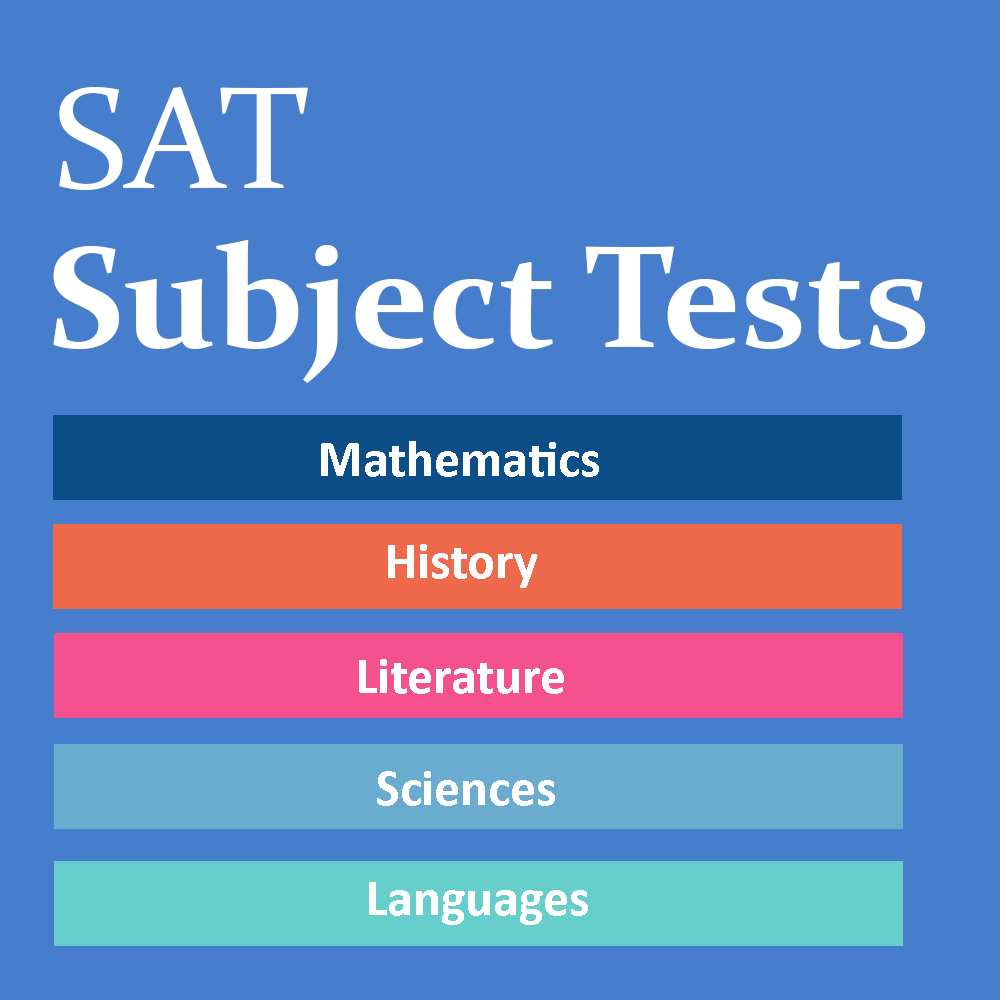The SAT Subject Tests are standardized tests given by the College Board on individual academic subjects.
Here are your options for the SAT Subject Tests:
Math: Level 1, Level 2
Science: Chemistry, Physics, Biology (Ecological/Molecular)
English: Literature
History: US History, World History
Language: Spanish, French, German, Italian, Modern Hebrew, Latin, Spanish with Listening, French with Listening, German with Listening, Chinese with Listening, Korean with Listening, Japanese with Listening
Why take SAT Subject Tests?
There are a number of reasons to take SAT Subject Tests, one being that many selective colleges require them. In many cases you are expected to submit two Subject Test scores, in addition to your SAT or ACT score. Subject Tests are also a great way to highlight your academic strengths and showcase your competence in a subject. They can also be used to signal your interest and commitment to a specific college major/program. For instance, if you’re applying to programs in engineering, you should emphasize your strengths in math and science. In that case, a good idea would be to take the Math Level 2 test, as well as a science test such as Chemistry or Physics.
Which SAT Subject Tests should I take?
When deciding which SAT Subject Tests to take, consider which academic subjects you excel in and are most comfortable with. Take the tests in which you’re confident about getting a good score! In addition, you can choose your tests according to what you want to major in. Here are some Subject Test recommendations based on your intended major or career track:
Engineering/computer science: Math Level 2, Physics
Pre-med: Biology, Chemistry, Math Level 1 or 2
Pre-law: English Literature, US History, World History
Finance/business: Math Level 1 or 2
Humanities: English Literature, US History, World History, any Language test
If you’re unsure about your prospective major, you can choose your tests based on the general area of study you may be interested in. It’s also wise to take a careful look at the admissions requirements of the colleges and specific programs you are interested in applying to – several colleges ask that you submit at least one score from a humanities test (e.g. Literature, World History) and one from a math/science test (e.g. Math Level 2, Chemistry). Specific programs within schools can also have their own special requirements.
Should I take science Subject Tests if I’ve taken the ACT?
While the ACT contains a science section, this is not meant to serve as a substitute for the science Subject Tests. The ACT science section assesses your general ability to think scientifically, rather than the specific content of your scientific knowledge. If you want to showcase your specialized knowledge in a science subject, you should take one or more of the Subject Tests in Chemistry, Physics, or Biology – even if you have taken the ACT and scored well on the science section.
SAT Subject Tests are an additional component of your college application that illustrate your skills and interests. Whether they are recommended or required by the colleges you’d like to apply to, it’s worthwhile to prepare for and take at least two Subject Tests to strengthen your college application.
What is considered a good score on the SAT Subject Tests?
In general, a good score on the SAT subject test would be anything above a 700. However, each subject test has a different average score. For example, the average score for the Math Level II SAT subject test is 694. It’s not enough to just be above average though. We encourage that you try your best and shoot for a perfect score. That’s why, as we stated earlier, it is important that you choose subject tests that complement your strengths. The higher the score, the better.
You should also set a target score for yourself. Your target score will depend on which colleges you are interested in applying to. Research what the average SAT subject test scores are for those colleges and aim to get a much higher score than the average.
If you want statistics on the SAT subject tests, check out this article from PrepScholar.
How should you study for the SAT Subject Tests?
As with any standardized exam, it is recommended that you start preparing several months beforehand, if not longer. The SAT and ACT are two major exams that you should start studying for during the summer of your sophomore year going into junior year. Continue studying throughout your junior year and eventually take your first exam in the winter or spring. This way if you aren’t happy with your score the first time around, you can take it again in the fall of your senior year. Generally, we don’t recommend taking the SAT or ACT more than three times.
Give yourself ample amount of time to study and get the material down. The same applies to your subject tests. However, you don’t need to study for the tests over the span of a year. You can start studying for the test 2-3 months in advance. First take a diagnostic exam to see where you stand. Your study schedule will depend on what your score is.
Choosing a subject test that complements your strengths, a good workbook, and self-studying should be enough for you to do well on the exam. However, if you feel that you can’t grasp the concepts, finding a tutor is always an option. Synergy Prep also has a great course on SAT and SAT subject tests that you can check out here.















